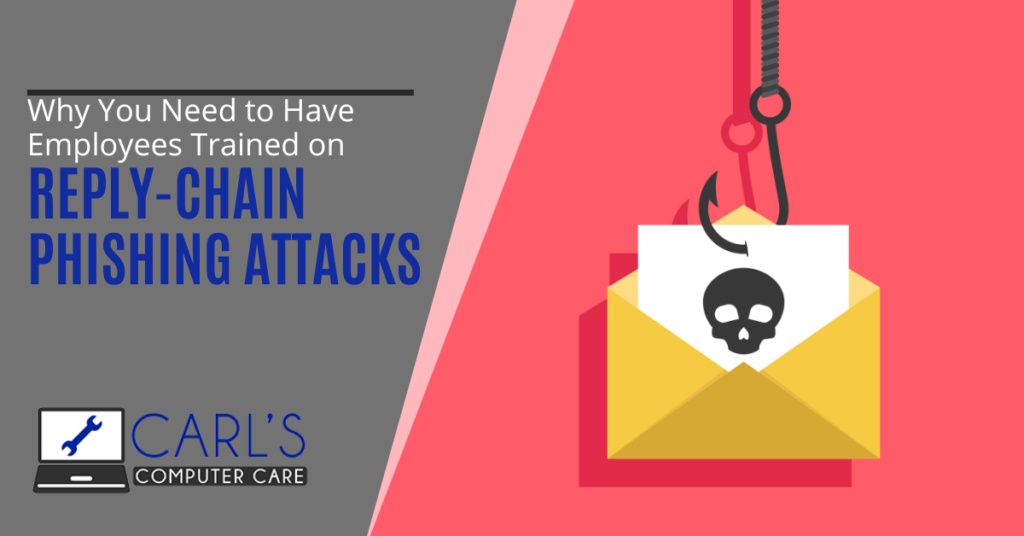
Cybercriminals are determined to get at unsuspecting individuals in any way possible. Phishing attacks have long been a constant threat to organizations and network security. Unfortunately, reply-chain attacks made phishing even more dangerous.
Reply-chain phishing is when a hacker gains access to a person’s email account and then looks for an ongoing group conversation and replies as if they were the person whose account they hacked. They will either insert a malicious link or attachment.
In reply-chain phishing, scammers can use a legitimate email address to send out malicious links to people. Sadly, employees often fall prey to these attacks because of the legitimacy of the email address the scammer uses. In addition, the emails are using a format that makes it difficult for recipients to identify as fraudulent.
Hackers have also devised a method that makes it easy to target organizations through a distribution list. As soon as this is achieved, they can get at multiple victims in a campaign.
This is a clever tactic that has left many organizations in trouble. Employers must, therefore, take it upon themselves to enlighten their employees about the dangers of falling prey to these attacks.
Here we will discuss the importance of training employees on reply chain phishing attacks.
3 Reasons Employees Must Be Trained on Reply Chain Phishing Attacks
1. To prevent financial loss
The current cost of a data breach is approximately 4.24 million, according to the latest “Cost of a Data Breach Report” from IBM Security. Not properly training your employees on all types of phishing tactics can be costly if it results in a data breach or ransomware infection.
Training employees on reply chain phishing attacks will prevent the organization from financial loss. Thus, employees will be more informed about the need to double-check any link in their emails before clicking on it. They will hopefully take a second look at any link that appears to be from a colleague. The employees will also realize that scammers can use legitimate email addresses to carry out their fraudulent activities and be on the lookout.
2. To ensure personal protection
Aside from protecting the organization’s image, employees also need to protect themselves. Sometimes, cybercriminals can manipulate an organization’s data by obtaining the employee’s personal information.
While it is fulfilling to know that the world has gone digital, numerous challenges come with this reality. Considering that technological innovations have encouraged keeping personal information on electronic devices, it is surprising that this information can easily be manipulated.
Cybercriminals use enticing and personal words to trick their victims. Employees may mistake this conversational style to mean a close rapport with the perceived sender. When employees are trained on the various tactics employed by cybercriminals, they won’t be easily swayed by personalized emails.
Employees will be better placed to protect their personal information from getting into the wrong hands of these scammers.
3. To secure organization data
It is near impossible for employees to ensure organizational data is safe from a breach when they do not know how to enforce cybersecurity measures. Training your employees on cybersecurity practices such as multiple-factor authentication, reporting suspicious mail activities, and strong passwords will protect the organization’s data.
4 Elements Employees Can Use To Identify Reply Chain Phishing Attacks
1. Poor formatting
Employees must be on the lookout for poor email design. Emails may have typos, grammatical errors, or say something that doesn’t sound quite right. Some hackers are not keen on using a good choice of words and formatting techniques. Employees must consider this a tip-off and discard or report the email as potential phishing.
2. Generic information
It could be a phishing mail if the information does not look specific. Most phishing attackers are trying to get out a large volume of emails, and do not take the time to personalize emails to send to their victims. Instead, scammers would prefer sending out multiple emails simultaneously to various individuals, so they’ll tend to be more generic.
3. Domain name
The domain name is also an excellent way to identify a reply chain phishing attack. Employees must verify the sender’s email address and ensure it is from a legitimate source. Sometimes, the imposter will forge the email address and make it appear authentic. Employees must be cautious in receiving emails from unknown individuals or addresses. But, it’s also important to remember that with a reply-chain attack, often the legitimate sender’s email has been hijacked, in which case the domain name may be correct.
4. Unsolicited information request
Whenever employees get emails from a supposed colleague asking for information that pertains to the organization, do not be in a hurry to give it out. Verify from your colleague if they authorized such an email. If not, do not disclose the information. It could be a ploy to affect the organization.
Protect Your Employees From Reply-Chain Phishing Attacks
As an organization, you cannot afford the risk of having employees who are not aware of cybersecurity practices. This mistake will affect the organization’s goals and its sustainability as well.
Are you looking for ways to protect your employees from reply-chain phishing attacks? Contact us; we’ve got the right strategies!
